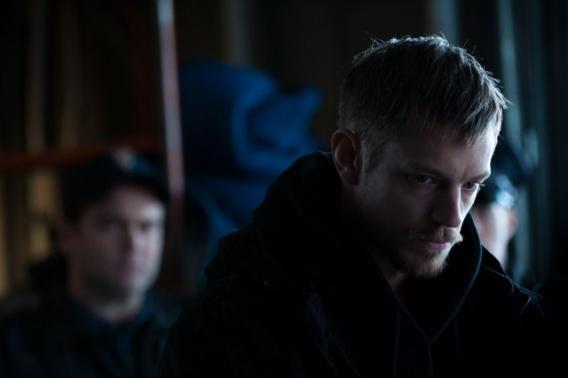In an early episode of The Killing, Stephen Holder (Joel Kinnaman) lurks in a schoolyard, smoking and sizing up two teenage girls who have stayed after school for soccer practice. One of two detectives who work on the show’s titular murder, he has a wiry frame that he carries with an air of calculated, hunched indifference. When the girls finally approach him, he offers them pot, exciting and frightening them with the possibility of “partying” somewhere else. They give him the information he needs, and he wanders off without another word.
Wily, ethically flexible detectives are old hat in murder mysteries, of course, but Holder’s predatory aspect is not merely a function of his guile. Consider that the scene mentioned above takes place in a series about the brutal murder of a 17-year-old girl.
Holder’s duality is obvious even from the moment we first meet him, when he’s introduced as the would-be replacement for detective Sarah Linden (Mireille Enos). Long before we learn of his past as an undercover junkie, he exudes an ominous energy, gaunt and perpetually wired. (In interviews, Kinnaman frequently thanks the series’ makeup artist, who, he told Slate, “always fixed it when it looked like I’d had too much sleep.”)
In a show of many dark corners and ambiguous characters, Holder has been a reliably bracing force. The series itself, on the other hand, has been less consistent. After florid praise and strong fan interest for the early episodes,The Killing’s well-documented fall from grace culminated with a 33-percent dropoff in viewers for April’s second-season premiere. Theories abound as to where the show went wrong. In Slate, Meghan O’Rourke pointed to its nuanced portrayal of grief as a non-starter for many viewers accustomed to tidier procedural conventions.
Whatever its missteps, The Killing’s fascination for me has always resided in the detectives themselves, flawlessly embodied by Enos and Kinnaman, who is still much more famous in his native Sweden than he is in the U.S. (He’ll become more recognizable next summer, when he assumes the title role in the RoboCop remake.) Holder’s icy relationship with Enos’s Linden slowly gives way to halting camaraderie, and the same could be said for viewers (some of us, anyway). He has an easy rapport with Linden’s teenage son—“little man,” he calls him—and his tortured gait begins to loosen up as he starts to hustle as a detective. By the time he tells Linden of his days with “Kristy,” we have begun to accept his personal narrative as a reformed addict liberated from a past self.
That ruse doesn’t last, though, and his character’s contradictions deepen. He helps engineer evidence. He gets played by a police official whom he foolishly trusts. And in a searing sequence from a recent episode, he snaps, giving life to the predator that’s been simmering within him. He leaves an N.A. meeting and viciously attacks his former dealer—and even his dealer’s mother, her oxygen tubes getting nearly ripped from her face. Linden later finds him wandering along an expressway bridge.
Holder’s character is a volatile mix of several cop-show archetypes—corrupted narc, slippery detective, reluctant model of recovery. He wanders through the show, unkempt and hungry, only occassionally interrupted to play a part in its dubious plot. In this past week’s episode, Linden frantically takes her son to Holder’s dingy apartment after she’s been threatened; in an absurdly comic note, Holder is alone, fumbling over homemade sushi. But whatever happens in the seven episodes left before the series’ promised final revelation, he surely isn’t through with that bridge.
Previous Character Studies:
April Ludgate, Parks and Recreation
Tyrion Lannister, Game of Thrones
Britta Perry, Community
Sally Draper, Mad Men
Amber Holt, Parenthood
Sterling Archer, Archer
Dexter Morgan, Dexter
